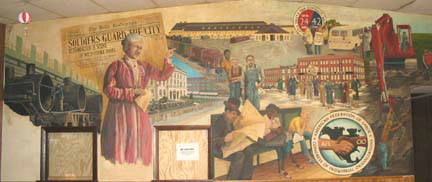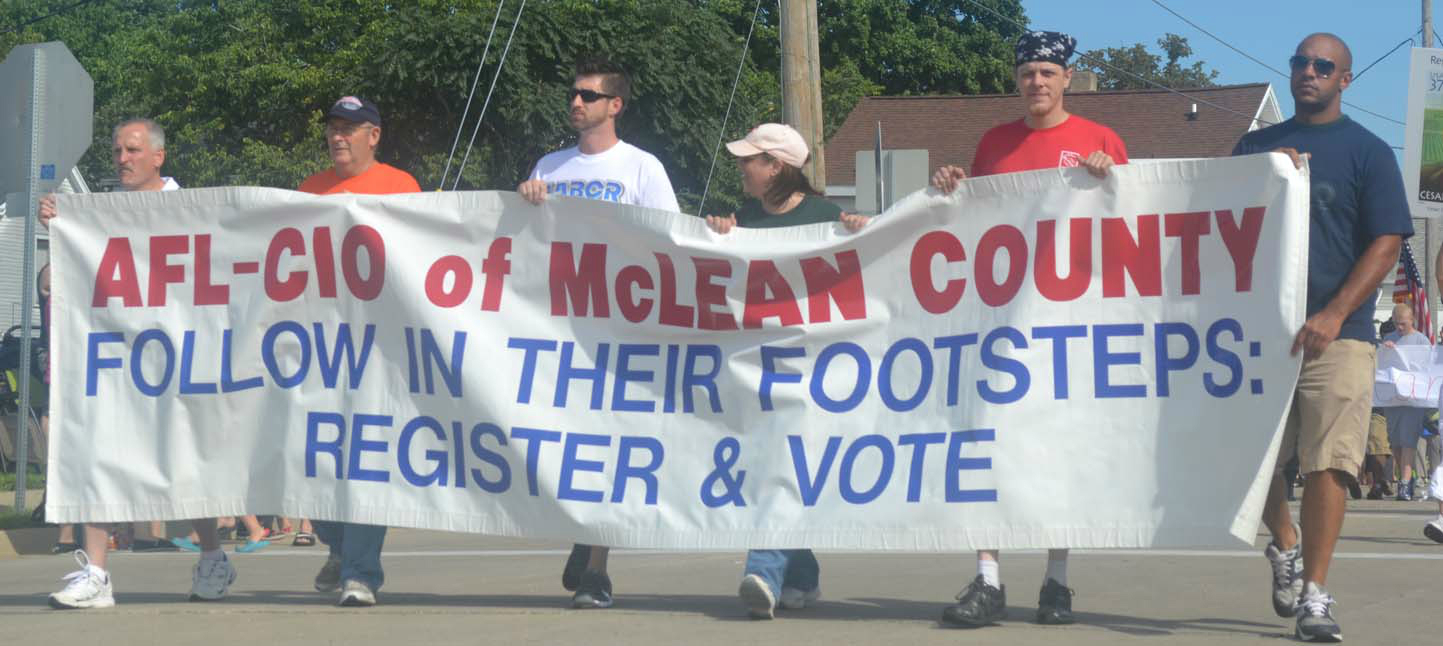|
BLOOMINGTON — For 33 years, the Bloomington-Normal labor history mural served as the backdrop for union meetings, rallies and political gatherings. On Sunday, local artist Kari Sandhaas and her husband, local labor leader Mike Matejka, shared their memories of the wall that will soon be coming down with the demolition of the Laborers’ Local 362 old hall at 2012 Fox Creek Road in Bloomington.
“It’s my hope that those who see this mural will be reminded of the union struggles of the past and their impact on workers today,” Sandhaas said. “A union, indeed any community, is only as good as its members’ determination to stand together and willingness to look out for one another. This combination of courage and solidarity is found in the stories depicted in this mural.”
The mural, done in acrylics, features local labor history scenes. These include the Bloomington Chicago & Alton Railroad Shops, Mary “Mother” Jones and the 1917 transit strike, the 1922 national railroad Shops strike, the 1937-38 Beich Candy (now Ferraro) strike, a 1930s to 1970s unemployment bench, the 1978 Normal Fire Fighters’ strike and a construction scene.
“This is a piece to bring pride to people,” Matejka said. “To have this piece in this room is very significant. It wasn’t just people going to their union meeting. This piece has a significant story. It gave context as to why they were meeting here and what the building represented. Of course, this was a hiring hall and construction laborers who were out of work could come and sign up to find work. In the spring, there could be 70 people out here during the day.”
 The Bloomington-Normal labor history mural, which is located at the Laborers' Local 362 old hall in Bloomington, will be lost when the building is torn down. The Bloomington-Normal labor history mural, which is located at the Laborers' Local 362 old hall in Bloomington, will be lost when the building is torn down.
The mural is painted directly on the wallboard at the old union hall, making saving it in its entirety a difficult challenge. Local photographer Ken Kashian has documented the mural to enable a smaller, printed version to be produced for the newer Local 362 hall.
Sandhaas was an Illinois State University art education major when she began the mural. It took four years and about 600 hours of work to finish the project. A college degree and birth of a baby slowed her progress after her start. But, she always worked toward the goal of finishing the project.
Much of the mural was taken from photographs to make them more “true to reality.” In many instances, union members brought in pictures of their own families, which she used. There is even a younger Mike Matejka depicted sitting on a bench.
“The combination of courage and solidarity is found in the stories depicted in this mural,” Sandhaas said. “Whether working day to day, side by side, or holding strong to ideals and rights amidst times of crisis, these scenes represent significant local labor history events of the past, while recognizing a strong community and labor force in the present.”
 Veronika Burger, an artist from Austria who is studying in Chicago, made the trip down to see the mural after she saw it was going to be destroyed soon. Veronika Burger, an artist from Austria who is studying in Chicago, made the trip down to see the mural after she saw it was going to be destroyed soon.
“I just wanted to take a look at it in real life,” she said. “It’s a very good work.”
Matejka and Sandhaas said they will miss the mural once it is gone.
“In nearly 40 years, there hasn’t been one incident of graffiti or any type of vandalism to it,” Matejka said. “It is a little bit yellowed, because for a time, you could smoke in here, but it is still in great shape, besides that.”
Kevin Barlow - Bloomington Pantagraph, July 22, 2019
|



